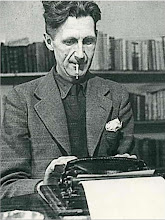Sunday, January 10, 2010
The machine that lies in wait
Posted by
Dactyl
at
12:58 PM
4
comments
![]()
Wednesday, December 30, 2009
Stay on top? Or get to the bottom?
Email is a wonderful thing for people whose role in life is to be on top of things. But not for me; my role is to be on the bottom of things. What I do takes long hours of studying and uninterruptible concentration.
I have been a happy man ever since January 1, 1990, when I no longer had an email address. I'd used email since about 1975, and it seems to me that 15 years of email is plenty for one lifetime.
Posted by
Dactyl
at
7:58 AM
3
comments
![]()
Sunday, December 20, 2009
The Great Typewriter Price Delusion
He looked at the price tag and scoffed..."good luck with that. A guy right over their has one for $10...and I saw another one over that way for the same. You ought a go buy 'em all and corner the market if you think they're worth that!{hahaha}".
{picture me standing there with a look of utter shock at how rude some people can be...slowly changing to a look of I'm gonna kick yourassbutt right out of this booth if you don't shut up and move along}.
Well, as it turns out he was giving me some sage, albeit sarcastic, advice. To my detriment I was too affronted to take it.
Dear old typewriter seller:Your machine is beautiful. However, unless it is a museum-quality antique belonging to the early days of typewriting, it is not particularly valuable in the monetary sense. We're probably talking two-digit numbers here, and usually low two-digit numbers.Yes, there are some internet stores that charge more--a lot more. That's just their thing. Such prices aren't representative of the market as a whole, as you'll find if you attempt to emulate them. A far better (and less time-wasteful) approach is to set a price that will guide it into a good home. If you need some benchmarks, watch eBay and see how much models like yours (be honest about condition) are going for, then price accordingly.Thank you.
Money image
Posted by
Dactyl
at
10:13 AM
9
comments
![]()
Friday, July 3, 2009
It Takes a Type O Ribbon...

Posted by
Dactyl
at
8:01 AM
0
comments
![]()
Saturday, June 27, 2009
A Robotron Story, or, What's YOUR Excuse?
"I borrowed it (when I was 20) from a relative who had stolen it from some office, where he said they didn’t use it. I still haven’t returned it to him. At the time it was part of my dream come true...Its keys, a bit obstinate, helped me to become stricken with numerous bouts of tendonitis, but also with more than 10 books. "
"It’s relatively easy to write without a ribbon, using a white sheet of paper with carbon paper on top. Though all you can see is the black sheet as you write, at least you have the security that the final copy won’t fade so easily.
From time to time you have to remember what was written at the top of the page; that’s easy, you remove the carbon paper, read it, and then slide the sheets back into place, trying to situate them where you left your last half-completed sentence."
Posted by
Dactyl
at
7:12 PM
2
comments
![]()
Thursday, June 4, 2009
The Mystery of the Typewritten Stamps

Posted by
Dactyl
at
5:06 PM
2
comments
![]()
Labels: stamps, that'll never happen again, typewriters
Typewriters: a 21st century technology?

- a.) it uses no electricity, and
- b.) putting it to use keeps a big ol' hunk of metal, plastic and rubber out of the dump.
- Toner cartridges versus typewriter ribbons. One is an expensive, intricate, proprietary delivery mechanism for powdered chemicals. The other is a strip of cloth dipped in ink.
- Less paper used. Yes, really. You might think that having to retype would lead to more wasted pages, but in my experience the opposite is true. On the computer, I find myself often printing out drafts, because it's just the touch of a button. On a typewriter, you think twice.
- Extended lifespan of computers. If you're using your writing machine to write, you're using your computer less. That means reduced wear and tear, and longer product life.
Posted by
Dactyl
at
12:20 AM
0
comments
![]()
Labels: environment, green, typecasting, typewriters
Wednesday, June 4, 2008
Bad Blurbs, Good Books
The economist Brad DeLong puts forth an interesting "parlor game" on his blog: write the worst blurb you can imagine for the best book you can think of. It's an illuminating exercise, because it helps one realize a couple of things:
1.) that "literary" is really a perceptive filter, a sort of lighting effect that casts a work as somehow Important.2.) that even works of high literature are propelled by plots. When you strip them down to that level, some etherial classics have rather down-to-earth dynamics at their core.
Plucky heros travel across a fantasy world, encountering strange creatures and languages (invented by the author!) to destroy a magic artifact, while being pursued by Minions of the Dark Lord.
(Note: I do have to point out one thing, though: These aren't really "blurbs", per se. A blurb is a dollop of praise, doled out by one author for another. These are imagined instances of jacket copy, which pursues an enticing precís of the story within the covers. There's a difference, but the exercise remains worthwhile.)
Posted by
Dactyl
at
9:09 AM
0
comments
![]()
Labels: blurbs, literature, marketing, wordplay
Saturday, May 3, 2008
[sound of platen racheting fresh sheet of paper]
Posted by
Dactyl
at
6:42 PM
0
comments
![]()
Labels: Beginnings, blog stuff, hello



